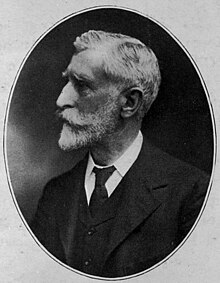William Martin Murphy
William Martin Murphy was an Irish businessman and politician, best known for his role as leader of an employer's syndicate in the Dublin Lockout of 1913, which led to him being dubbed 'William Murder Murphy' among Dublin workers and their press.

He was born on November 21, 1844 in Castletownbere, County Cork. He was educated at Belvedere College. When his father, a building contractor, died he took over the family business. His enterprise and business acumen expanded the business, and he built churches, schools and bridges throughout Ireland, as well as railways and tramways in Britain and Africa. He was elected Nationalist MP for St Patrick's, Dublin, in 1885. He was a member of the informal grouping, the Bantry band - a group of politicians who hailed from the Bantry Bay area. The Bantry Band was also disparagingly dubbed the Pope's brass band. Its most famous member was Tim Healy MP. It also included Timothy Michael Harrington, sometime Lord Mayor of Dublin City.
When the Irish Parliamentary Party split in 1890, Murphy sided with the majority against Parnell. But Dublin emerged as a Parnellite stronghold and in the general election of 1892 Murphy lost his seat by over three to one to a Parnellite newcomer, William Field. He made two attempts to return to Parliament, at Kerry South in 1895 and Mayo North in 1900, but both were unsuccessful.
In 1904 he bought three Dublin newspapers and replaced them in 1905 with the Irish Independent. In 1906 he founded the Sunday Independent. He refused a knighthood from King Edward VII that year, the culmination of criticism by Sinn Fein that he was desperate for one after his extravagent Trade Fair in Herbert Park, Dublin. In fact the King was in the process of knighting Murphy when he refused.
Worried that the trade unions would destroy his tramway system, he led Dublin employers against the trade unions, led by James Larkin, an opposition that culminated in the Dublin Lockout of 1913. This made him extremely unpopular with many, being depicted as a vulture or a vampire in the workers' press. After the Easter Rising he bought ruined buildings in Abbey Street as sites for his newspaper offices, however it was his viewpoints (expressed through the Independent that made him even more unpopular, by calling for the executions of Sean MacDiarmada and James Connolly at a point when the Irish public began to feel sympathy for their cause. Desperate to regain his Nationalism, he was invited to take part in talks in 1917 to agree Home Rule, however he discovered that John Redmond was planning on accepting it along with partition of Northern Ireland. This infuriated Murphy who criticised the plan in his newspaper, which destroyed the Irish Parliamentary Party. However, his plans had backfired, as the demise of the party resulted in the rise of Sinn Fein, whose separatist policies Murphy did not agree with.
He owned Clery's department store, the Dublin United Tramways Company, and other large concerns. He also owned and lived in the imposing two-storey mansion known as Dartry House in the Dublin suburban area of the same name. He wrote one book, The Home Rule Act, 1914, Exposed, 1917.
